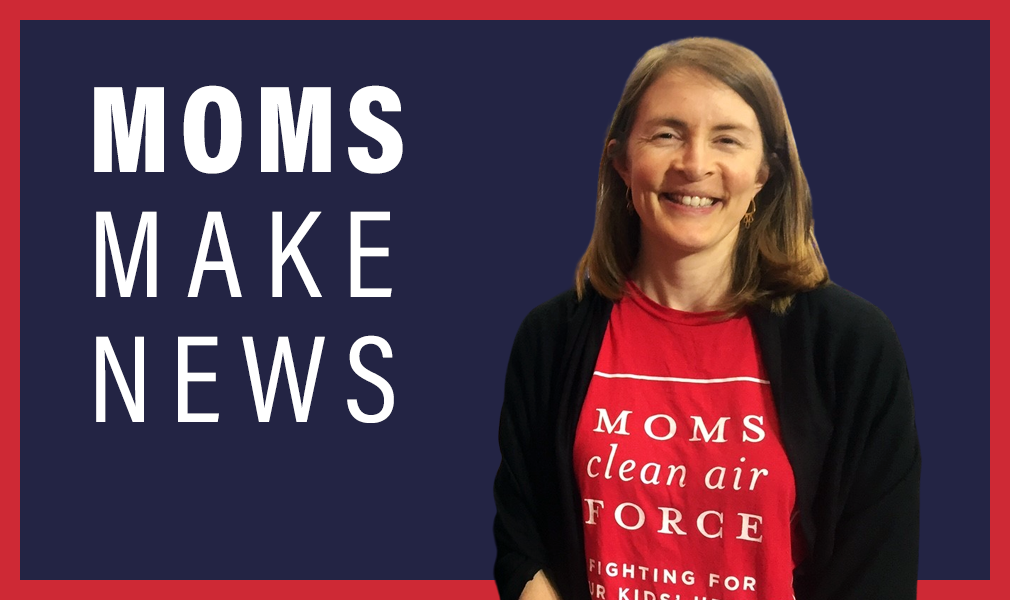Moms Make News: Climate Action as an Act of Self-Care

Written by Sarah McBride

It’s hard not to worry about our future–and our present–when wildfires, heat waves, hurricanes, and other climate crisis-fueled extreme weather events are making headlines. That’s why Senior Policy Analyst and mental health expert Elizabeth Bechard (pictured above) spoke with Reader’s Digest at length about climate anxiety, which Elizabeth defines as an “umbrella term to capture a wide range of emotions of distress about climate change.” Climate anxiety manifests in different ways for different people, but Elizabeth says that it’s “actually an appropriate, healthy response to what’s happening in the world.”
These feelings are uncomfortable, but Elizabeth reminds us that: “Our distressing climate emotions, like climate anxiety and grief, are reminding us that we are humans who care deeply about our loved ones, our communities, and the planet.” And Elizabeth says that we shouldn’t try to avoid them. “When we try to numb out our experiences of anxiety or grief with constant distractions, we also begin to numb our experiences of care and love. And we really can’t afford to lose access to our sense of love for each other and the planet. This love is what’s going to fuel the climate solutions we need.”
Climate anxiety can impact anyone, but the burden is not distributed equally. People of color may be at higher risk for climate anxiety since they are disproportionately impacted by air pollution, floods, and other consequences of the climate crisis. Elizabeth points out that this anxiety can compound other traumas: “For example, Indigenous communities in the U.S. faced generations of genocide, and Black communities have faced generations of slavery and systemic racism. For these communities, climate anxiety may add to an already sizable burden of anxiety from existing and historic racial inequities.”
Elizabeth encourages those struggling with climate anxiety to take action: “Finding ways to take climate action that aligns with your own resources, strengths, skills, and interests is also a really important way to help manage your individual climate distress.” But if you find that the weight of your anxiety or grief is too heavy, consider reaching out to a climate-aware therapist or mental health professional.
Read our Climate Change and Mental Health fact sheet and Elizabeth’s recent blog post for parents to learn more about managing climate emotions.
THE SO-CALLED “COST OF DOING BUSINESS”
Colorado field organizer Shaina Oliver lives near the Suncor oil refinery, which releases large amounts of toxic pollution into the air that residents like her breathe. Shaina explains to The Tyee that many families like hers don’t live near the major polluter by choice: “We live here because there’s nowhere else we can afford.”
Most of the residents living around the refinery are non-white, many are low-income, and Shaina can’t help but feel that Suncor sees harming the community as just the “cost of doing business.” Fundamentally, she says: “Suncor doesn’t support our existence.”
And Shaina has good reason for worrying about her community’s health. The types of pollution released by the refinery are known to trigger asthma attacks, contribute to heart problems, and are even linked to premature death. Shaina points out that Suncor’s impact on the surrounding community fits into a long history of environmental racism in this country. She says: “It is beyond time for Suncor to clean up its act.”
CLEAN SCHOOL BUSES, CLEANER AIR
Last month, Moms celebrated the launch of the Clean School Bus Program’s online application portal with Vice President Harris. Funding through the program will enable school districts to replace diesel-powered buses with zero-pollution ones.
Arizona field organizer Hazel Chandler urged her Senators to spread the word about the available funding. In a press release from the office of Arizona Senator Mark Kelly, Hazel explains why transitioning away from dirty diesel buses is so important to children’s health: “When I was the Director of the Maricopa County Asthma Coalition in the mid-2000s, I witnessed the impacts diesel buses have on children first hand. I watched repeatedly [as] children had severe asthma attacks just waiting for their school bus. In fact, I had to carry my own inhaler just to be in the vicinity of the buses. I am excited about the transition to zero emission school buses because it will protect the health of children…and help keep the air clean around our schools and neighborhoods. There’s nothing more important than our children’s and our grandchildren’s health, and future.”
SHOUT-OUTS:
- The Verge, Tech Times, and over a dozen other outlets reported on a letter that Moms Clean Air Force, Tesla, and several other organizations and companies sent, urging the Biden Administration to invest in charging infrastructure for medium- and heavy-duty electric vehicles.
- A Cambio16 article about the importance of large-scale reductions in climate pollution includes a tweet from our Michigan chapter and links to our interview with climate scientist Dr. Katharine Hayhoe.
